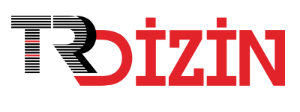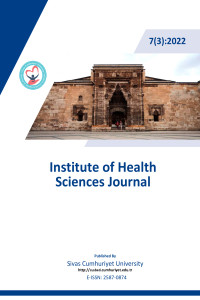Research Article
Case Report
Aim & Scope
Journal of Cumhuriyet University Health Sciences Institute, current clinical and experimental original articles, reviews, case reports, editors in the field of veterinary medicine, dentistry, pharmacy, medicine, physiotherapy and rehabilitation, nutrition and dietetics, midwifery and nursing. It aims to publish studies on multidisciplinary fields with letter type studies.
In the Journal of the Institute of Health Sciences of Cumhuriyet University, in the fields of Veterinary Medicine, Dentistry, Pharmacy, Medicine, Physiotherapy and Rehabilitation, Nutrition and Dietetics, Midwifery and Nursing, clinical and experimental original articles, reviews, case reports, editor letter type articles are included.
Author Guidelines
- Journal of Cumhuriyet University Health Sciences Institute
- Writing rules
Cumhuriyet University Journal of Health Sciences Institute is an international, peer-reviewed scientific journal published by Sivas Cumhuriyet University, Institute of Health Sciences. There is no fee for publishing an article in the journal. Articles containing new national or international information can be submitted to the journal. Articles submitted to the journal must be unpublished and based on research results (except review articles). The submitted article should also not be in the process of being evaluated for publication in another journal. The authors named in the article acknowledge that they took an active role in the preparation of the publication and that they are responsible for the issues they contribute. The plagiarism rate of the article should not exceed 25%. Otherwise, the article will be rejected. The articles of the authors who do not take action within the given time will be returned. The language of writing is Turkish or English.
- Page Settings
Articles should be in Word format, the text should be in a single column and the page margins should be set at 2.5 cm from all sides. The text should be 12 point Times New Roman, with 1.15 line spacing. While preparing the article, especially the automatic word correction function of the used word program should be turned off and words should not be allowed to be split at the end of the line. The number of pages should not exceed 15 for research articles and 20 for reviews. Line numbers and page numbers in the lower right corner should be added to the text file of the article. While preparing the text of the article and its appendices, care should be taken that there is no information that will introduce the author in the sub-addresses of files such as Word or Excel. In addition, the names of places and institutions that will introduce the author should not be specified in the article and in the material and method section, unless it is necessary. While presenting the article, the title page, text file, transfer agreement and author contribution form and, if necessary, permission from the relevant local ethics committee should be attached.
- 1. TITLE PAGE
The title page should include the name of the article (first letters capitalized), the names, surnames, ORCID numbers and addresses of the authors, and the e-mail address of the corresponding author. The names of the authors should be given in full without abbreviation. If there is an author from more than one institution in the article, the institution of the author should be indicated by numbering as a superscript at the end of the author's name. Addresses should likewise be specified exponentially. In addition, the corresponding author should be indicated with a superscript asterisk.
2. TEXT FILE
The text file should be prepared in the order of introduction, materials and methods, findings, discussion, conflict of interest, acknowledgment, references and figure headings starting from the new page after the title of the article in the language in which it was written, abstract, keywords, English title, abstract and keywords.
Section headings in the text file should be capitalized and bold. Secondary titles should be written in bold, only the first letter capitalized. If any, the first letter should be capitalized and italicized in the sub-headings.
Abstract: The abstract should be written under a single title, including the purpose of the study, the types studied, materials and methods, new theories and terminologies, and conclusions. The abstract should be presented in clear and understandable language, without any subtitles or references. The abstract should not exceed 250 words. A maximum of 6 keywords should be given after the abstract.
Introduction: In the introduction, the purpose of the current study should be clearly emphasized, starting with the definition of the problem and expressing the findings and results of previous studies.
Materials and Methods: Materials and methods should be clearly described as the methods will be replicated or tested by other researchers. Methods or tests that are considered standard can be stated simply by name or cited by reference. The basic principles of the method should be briefly explained in relation to the chemical procedures expressed by citing the source.
Results and Discussion:
The results of the studies should be explained clearly in the findings section.
Study findings should be interpreted by comparing them with current literature. It should be correlated with previous studies, and concordant and inconsistent results should be discussed. The practical importance of the results of the study and its potential to pave the way for future studies should be expressed.
Conclusion: At the end of the discussion section, it should be included in a title where the main results of the study are expressed.
Conflict of Interest Statement: It should be stated whether the authors whose names are listed in the article have any conflict of interest with any person or organization regarding the data presented in the article and/or the subject of the article.
Acknowledgments: Institutions and organizations that supported the study, if any, should be specified in this section. In addition, people who are not among the authors of the study but have contributed to a certain extent can be thanked in this section.
Sources: Current articles, books, book chapters, thesis, or online sources can be used as a source.
Ethical Principles and Publication Policy
Publication Ethics
Publication processes of The Journal of the Institute of Health Sciences of Cumhuriyet University are based on producing, developing and sharing knowledge evenhandedly within scientific methods.
Refereed articles are studies require scientific methods and they provide objectivity. All components of publication process (publisher, editors, authors, reviewers and readers) should obey ethical rules for scientific production. Within this context, the policies of ‘publication ethics’ and ‘open access’ also require all components of publication process to obey the ethical principles, in direction of guides and policies of Committee on Publication Ethics (COPE), as “Code of Conduct and Best Practice Guidelines for Journal Editors” and “COPE Best Practice Guidelines for Journal Editors”.
In case we identify that author(s) of the manuscript use(s) falsified and fabricated data, then we will report this to the institution of the authors where he/she works and reject the manuscript. Editorial members of the journal and/or the reviewers reserve the right to ask author(s) to provide raw data which was used in the manuscript.
Ethical Responsibilities of the Publisher
Sivas Cumhuriyet University, the publisher of The Journal of the Institute of Health Sciences of Cumhuriyet University, is a public-spirited and nonprofit-making public educational institution.
The Journal of the Institute of Health Sciences of Cumhuriyet University Administrative Committee constitutes Editorial Board of The Journal of the Institute of Health Sciences of Cumhuriyet University. According the subject of the study, the editor can send an article to some other instructors out of Editorial Board as field editors.
The Responsibilities of Editorial Board of The Journal of the Institute of Health Sciences of Cumhuriyet University
• Editorial Board of The Journal of the Institute of Health Sciences of Cumhuriyet University is responsible for all processes of the articles sent to the journal. This responsibility requires deciding independently by considering public interest, not personal gains. The relationship between Publisher and the Editorial Board is based on independence policy, and all decisions of the editors are independent from the publisher and the other persons and institutions.
• Editorial Board of The Journal of the Institute of Health Sciences of Cumhuriyet University permanently strives to develop and raise the quality of the journal.
• Editorial Board of The Journal of the Institute of Health Sciences of Cumhuriyet University determines and performs journal policies as publication, blind review, evaluation process and ethical principles.
• Editorial Board of The Journal of the Institute of Health Sciences of Cumhuriyet University keeps copyrights of the articles published in The Journal of the Institute of Health Sciences of Cumhuriyet University.
• Editorial Board of The Journal of the Institute of Health Sciences of Cumhuriyet University is responsible for keeping intellectual property rights of authors in publication processes and guarding against unethical behaviors, plagiarism and reference gangs.
• Editorial Board of The Journal of the Institute of Health Sciences of Cumhuriyet University prepares a “Guide for Authors” to inform authors and “Guide for Reviewers” to inform reviewers about evaluation processes.
• Editorial Board of The Journal of the Institute of Health Sciences of Cumhuriyet University determines incentive policies for the authors.
• Editorial Board of The Journal of the Institute of Health Sciences of Cumhuriyet University her keeps records of every article electronically or in written forms.
The Responsibilities of Editors, Editor Assistants and Field Editors
• Editors try to inform reviewers, authors, researchers and readers, to answer their questions clearly within the principles of clarity.
• Editors, during the publication process, consider that the articles should be original and contribute the literature, the readers and researchers.
• While editors are making decisions about the article publication, they consider originality, contribution to the field, clarity of expressions, content and validity and reliability of the articles.
• Editors take the articles without any problem to the preliminary evaluation, consider positive views of reviewers, and they do not change the decisions of the reviewers unless there is a big problem for publishing.
• Editors implement the policies of blind review and evaluation processes, keep private personal identity information of the authors, and provide impartial evaluation processes in due of time for the articles.
• Editors send the articles to field editors and reviewers considering their professional fields, and care that the articles are evaluated impartially and independently.
• Editors, in evaluation processes, consider if there are conflicts or collaborations between authors and reviewers or not.
• Editors generate a large number or reviewers, and they update it consistently.
• Editors prevent non-scientific that do not comply with academic etiquette rules.
• Editors ensure that journal publishing processes are operated in accordance with publishing policies and guidelines, inform those who are in the process of the developments on publishing policies, and prepare training programs when necessary.
• Editors communicate effectively with everyone involved in the publishing processes, and organize meetings at regular intervals.
• Editors provide protection of personal data in assessed articles; they keep personal data of authors, referees and readers.
• Editors attach importance to the protection of human and animal rights in the articles, emphasize that the clear approval of the participants of the article is documented, and rejects the articles witout the approval of the ethics committee on the participants of the article and without any permit in experimental investigations.
• Editors take precautions against misconduct. When there are complaints about the abuse of duty, they share the findings about the subject by conducting an objective investigation.
• Editors provide errors, inconsistencies, or misleading errors in articles to be corrected.
• Editors protect the intellectual property rights of the published articles, and defend the rights of the journal and the author (s) in case of violation. Editors also take the necessary precautions to ensure that the content of the published articles does not infringe the intellectual property rights of other publications; they control authenticity-similarity.
• Editors considers consistent critiques for the articles published in the journal and enables authors to answer these critiques.
• Editors considers the studies including negative conclusions also.
• Editors evaluate the complaints sent to the journal and make necessary statements.
Ethical Responsibilities of Reviewers
The articles in The Journal of the Institute of Health Sciences of Cumhuriyet University are evaluated by double-blind review in a process, which neither the authors know the reviewers nor the reviewers know the authors; reviewers cannot communicate the authors directly; article evaluation forms and proofreading requests are sent to the authors through the website of the journal. Reviewers must bear the ethical responsibilities in The Journal of the Institute of Health Sciences of Cumhuriyet University as below:
• Reviewers should only accept to evaluate the articles related to the field of their specializations.
• Reviewers should make the evaluation impartially and confidentially. In accordance with this principle, the articles they review should be annihilated after the evaluation process, but they should be used after publication. Nationality, gender, religious beliefs, political beliefs and commercial concerns should not distort the impartiality of the evaluation.
• When reviewers understand that there is a conflict or collaboration, they should inform the editors and refuse to evaluate the article.
• Reviewers must evaluate articles with a constructive attitude in accordance with the academic etiquette rules; they should refrain from insulting and hostile personal comments.
• Reviewers should evaluate the articles they agree on during the evaluation.
Ethical Responsibilities of the Authors
The ethical responsibilities of the authors that apply to The Journal of the Institute of Health Sciences of Cumhuriyet University as below:
• The authors should not send an article published in or sent to be published in another journal to Institute of Health Sciences of Cumhuriyet University at the same time.
• The authors should send original articles to The Journal of the Institute of Health Sciences of Cumhuriyet University. Authors should refer to the sources they use in writing articles in the correct way in the direction of ethical principles.
• Persons who do not contribute to the articles should not be listed as authors, and it should not be proposed to change the author order of a published article and to add authors.
• Reviewers must notify the editors of the conflicts and collaborations about the article.
• In the evaluation process of the articles the authors should provide the editorial staff with information about the articles or the raw data if required.
• The authors must document the rights to use the data they use in their articles, the permission for research or the approval of the participants to whom they have searched.
• Authors should communicate with the editors to provide information, to correct the article or to withdraw it when they are aware of the error associated with the evaluation and early appearance phase or the published article in electronic form.
• The author(s) must specify that they received the ethics committee approval for the researches that require data collection by using quantitative or qualitative methods such as experiment, survey, scale, interview, observation, focus group work that require ethics committee decision; the author(s) must also specify the name of the ethics committee, the date and the number of the ethics committee decision on the first-last page and in the method section of the candidate article. In addition, the author(s) must include information on the fact that the informed consent form was received for the case reports in the articles.
• The author(s) should present proof of their ethical principles for data collection process (such as obtaining permission from others to use their documents such as scale, questionnaire, photograph etc.) in the article. It should be noted in the articles that the copyright regulations for research and publication ethics and intellectual and artistic works are complied with. If the study is conducted on human and animal subjects, it should be reported in the article that the study was carried out in accordance with international reports, guidelines, etc.
• Ethics committee approval is not required for review articles from the author(s). However, it should be stated in articles not requiring an ethics committee decision that the ethics committee decision is not required on the first-last page and in the method section of the article.
Notification of Ethics Non-Principles Status Editor
In case of encountering an unethical situation in articles or about editors, reviewers and authors or in articles that does not comply with the ethical principles regarding in the The Journal of the Institute of Health Sciences of Cumhuriyet University, it should be reported by cusbid@cumhuriyet.edu.tr
Price Policy
Accepted articles are published on-line free of charge from the journal website.
Indexes
Journal Boards
Editorial Board (2025)
Editor-in-Chief
Executive Editors






Associate Editors
Job title: Associate Professor for Nursing and Midwifery Education Leadership
I am a Doctoral researcher in Education. I hold an MSc, MA Ed, PGDip, BSc, and a B. Ed in Economics, Business management and Accounting. I am a Senior fellow of the Higher Education Academy and a Nursing and Midwifery council registrant for Midwifery, Nursing, Nurse Prescriber and Specialist Community Public Health nurse (Health visitor). I have an extensive and varied clinical experience within the fields of midwifery and several specialist areas in nursing such as intensive care unit and public health which spans over decades. I have special interests in women and children’s health, social justice and the factors that create, enhance, and enrich students' experiences and lower attrition rates. I have taken on several senior academic roles in BNU, including Director of Education for nursing and midwifery programmes, programme leadership and a BSc year one lead, at the height of the Covid-19 pandemic. My pastoral support and nominations contributed to the shortlisting of four prestigious professional national awards for my personal tutees, with one winning a highly reputable national award.
I am a peer reviewer for a significant number of reputable midwifery and nursing journals and contribute to the plethora of knowledge for professional practice. I offer expert impartial and independent advice for Nursing and Midwifery programmes as an external examiner for other universities, including as an external for NMC validated programmes to assure and enhance a quality curriculum and delivery.
I have been involved in experts’ conversations in parliament to drive national policies and initiatives that enhance early years provisions, such as 1001 critical days. I have given impetus to research and exploratory research in practice, through the sharing of case studies on safeguarding vulnerable children and women to inform service delivery. I initiated and developed a safe home birth travel system for a major maternity unit in London to ensure safety for mothers and babies during home births.
I am a member of the Royal College of Midwives and an active member of the Royal College of Nursing with a union steward representative role. I am a strong advocate for social responsibility and adhere to the Nolan principles being a volunteer for several charities including school governor and trustee roles. I completed the reputable NHS leadership academy over a decade ago. I relish the mentorship opportunity that this role affords in enabling me to mentor senior nurses and midwives within the association, who aspire to be excellent leaders within their fields.
It is humbling to have been a recent winner for the highly esteemed and prestigious Zenith Global Health award, for Excellence in both the fields of Nursing and Midwifery. It is a great honour to be a current institutional wide winner for Excellence and Innovation in Student Learning and Support. It is a great privilege to have recently been a finalist for the Student Nursing Times Awards for University Educator of the year. I am proud to have been a finalist for the Royal College of Midwives awards for Excellence in Midwifery leadership in recognition for my nationwide work in midwifery, particularly with Black and African midwives. My proud moments include yearly institutional award finalist for the past five years for the learner impact award, teaching impact award, outstanding impact award, the most inspirational lecturer award and several others.
I am proud to have been a School Director of Education for Nursing and midwifery for years, with strategic and operational leadership for all Nursing and Midwifery programmes; to ensure innovative, distinctively high in quality and internationally comparable and competitive programmes. It is always a great privilege to have shared several research studies on international platforms such as Advance HE conferences. It is an honour to be a regular invited speaker for organisations such as the Royal College of Nursing, to contribute to knowledge exchange, to enrich and improve nursing and midwifery practice and profession of which I am immensely proud to be a part of.



Dr. Hazar conducts research in the field of movement and training science in the areas of training information, sport psychology, sport biology and sport physiology.
Stevo Popovic is a full professor at University of Montenegro who has 10+ years’ experience with particular focus on planning, conducting, and evaluating research studies dealing with health and exercise, which also include clinical trials. As a sports and exercise scientist he uses knowledge of how the body works to help people improve their health and sporting ability at large. However, he has also profound insight into physical anthropology, and understands the complexity of how physical activity affect the human body and its composition; but, also into social anthropology that helps to understand the social side of the same issues. With a background as a Ph.D. from the University of Novi Sad and postdoc from the University of Ljubljana (ranked 1st in Slovenia, 326th in the global 2024 rating, and scored in the top 50% across 228 research topics), as well as a teacher and research at the University of Montenegro, he has achieved the following key competencies: knowledge of teaching and the ability to design courses, project and data management, study design expertise, excellent communication skills, and dissemination skills in both written and oral etc. He currently holds several leading positions in the national and international projects, as well as leading roles and memberships in the governing bodies of professional and scientific organizations. He is a former Dean of Faculty of Sport and Physical Education and Editor-in-Chief of University of Montenegro Press, both in two mandates, former member of HEPA Europe Steering Committee, FIEPS Board of Directors member and member of Montenegrin Academy of Science and Art (Centre for Young Scientists and Artists). On the other hand, among several other positions, he is currently a Co-Director of Balkan Institute of Science and Innovation and Associate Editor in British Journal of Sports Medicine (Physical Activity and Population Health section). Authored 85 articles in peer-reviewed journals indexed by Scopus database (17% as the first, 19% as the last, 55% as the co-author and 9% as the single author; 71.6% of documents co-authored with researchers in other countries/regions; 32.4% of documents in top citation percentiles; 27.4% of documents in the top 25% journals), several books, book chapters and conference papers and abstracts. Cited >7,600 times; H-index = 22; Field Weighted Citation Impact (FWCI) = 5.08. As a supervisor or methodological consultant contributed to five PhD dissertations as well as many bachelor and master research theses. In 2020, on the Stanford/Elsevier’s list of top 2% researchers globally.

Dr. Bojan Masanovic serves as an Associate Professor at the Faculty of Sports and Physical Education at the University of Montenegro. In addition to his academic role, he currently holds the position of Vice-Dean for International Cooperation at the same institution. He is a recognized member of the consortium for several scientific research projects (both national and ERASMUS+ Sport) focused on innovative approaches to advancing the field. Through the EAPA-BCH project, he co-founded an innovative nutrition and exercise program for the elderly. He also contributed to the EUFITMOS project, developing an innovative battery of tests used across Europe, and led the SWOST project, establishing a methodology for improving gender equality. Additionally, he is one of the creators of the groundbreaking theory on the Autophagy Threshold and Autophagy Zones, and he and his team are currently working on determining when individuals enter the autophagy zone. Dr. Masanovic is active in the media, where he uses open letters to draw attention to important everyday issues and to propose solutions to decision-makers. He has highlighted concerns such as the prevalence of underweight children in Montenegro and advocated for a monitoring system to address and improve this situation. During the COVID-19 crisis, he emphasized the importance of physical activity for enhancing the immune system. Over the past five years, Dr. Masanovic has published more than 50 articles in Web of Science-indexed journals. In recognition of his significant contributions to scientific research, artistic, and professional work, the University of Montenegro awarded him a plaque in 2019 and 2024. He also received the Award for Outstanding Contribution to the Development of Education and Sports Sciences in Albania from the Albanian Association of Sports Sciences (ASSA). Most recently, in 2024, he was honored with the “FIEPS Thulin Award” for Distinguished Service in International Physical Education.
Layout Editors


Dr. Öğr. Üyesi. Salih NARLIÇAY
Dölerme ve Suni Tohumlama ABD’da görev yapmaktayım.
Editorial Secretary

IMPORTANT NOTE: Please note that the name and website of our journal have recently changed. Authors who wish to submit new manuscripts must do so through our updated platform at https://dergipark.org.tr/en/pub/ejmhs
The Journal of Sivas Cumhuriyet University Institute of Health Sciences is an international, peer-reviewed scientific journal published by Sivas Cumhuriyet University, Institute of Health Sciences.






